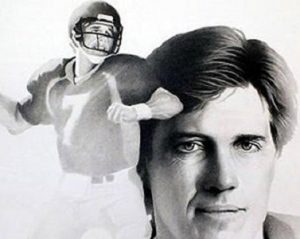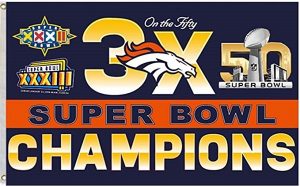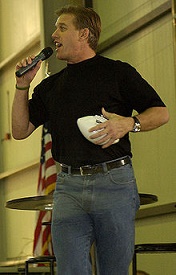[wpspw_recent_post_slider]
John Albert Elway Jr. (born June 28, 1960) is a former American football quarterback who is currently General Manager and president of football operations of the DENVER BRONCOS of the National Football League (NFL).
Elway played college football at Stanford and his entire 16-year professional career with the Denver Broncos. At the time of his retirement in early 1999, Elway recorded the most victories by a starting quarterback and statistically was the second most prolific passer in NFL history. He was also a prolific rusher of the ball, being one of only two players ever to score a rushing touchdown in four different Super Bowls (the other being Thurman Thomas and the only quarterback to do so.
Elway set several career records for passing attempts and completions while at Stanford and also received All-American honors. He was the first selection in the 1983 NFL Draft, famously known as the quarterback class of 1983, where he was taken by the Baltimore Colts before being traded to the Denver Broncos. In January 1987, Elway embarked on one of the most notable performances in sports and in NFL history, helping engineer a 98-yard, game-tying touchdown drive in the AFC Championship Game against the Cleveland Browns. The moment is known in National Football League lore as “The Drive.”Following that game in Cleveland, Elway and the Broncos lost in Super Bowl XXI to the New York Giants.
After two more Super Bowl losses, the Broncos entered a period of decline; however, that ended during the 1997 season, as Elway and Denver won their first Super Bowl title by defeating the Green Bay Packers 31–24 in Super Bowl XXXII. The Broncos repeated as champions the following season in Super Bowl XXXIII by defeating the Atlanta Falcons 34–19. Elway was voted MVP of that Super Bowl, which was the last game of his career, and in doing so Elway set a then-record five Super Bowl starts which was broken in February 2015 when Tom Brady of the New England Patriots started Super Bowl XLIX. As Denver’s quarterback, Elway led his teams to six AFC Championship Games and five Super Bowls, winning two. After his retirement as a player, he served as general manager and executive vice president of football operations of the Broncos, which won four division titles, two AFC Championships, and Super Bowl 50 during his tenure. Elway has been a member of the Broncos organization for all three of their Super Bowl victories, two as a player and one as an executive.
Elway was inducted into the Pro Football Hall of Fame in 2004 in his first year of eligibility and was inducted into the College Football Hall of Fame in 2000.
SIGNUP BELOW TO RECEIVE YOUR FREE EBOOK
Professional career
1983 NFL Draft
In the 1983 NFL Draft, Elway was selected as the first overall pick by the Baltimore Colts. Elway was wary of playing for the Colts, among the worst teams in the league at the time, and his father advised him against playing for head coach Frank Kush, who had a reputation as a harsh taskmaster. While Elway preferred football, his agent Marvin Demoff later stated that baseball was “a true option” for him at the time. The possibility gave Elway leverage in negotiations with the Colts.
After unsuccessfully attempting to negotiate a private agreement with the Colts in which Elway would cite his alleged desire to remain on the West coast to explain the team trading him, Elway publicly threatened to join the Yankees full-time if the Colts did not trade him; Demoff wrote in his journal, published three decades later, that “he would be a garbage collector before he’d play for Baltimore.” Elway’s refusal to join the Colts was controversial— Pittsburgh Steelers quarterback Terry Bradshaw denounced him, stating “you should play baseball … he’s not the kind of guy you win championships with”—but many other NFL teams began negotiations with the Colts for the quarterback. One possibility was trading Elway for the San Francisco 49ers‘ Joe Montana, whose team had had a poor season in 1982. Another was a trade with the San Diego Chargers, which was negotiating a new contract with its star quarterback Dan Fouts. The New England Patriots were interested, but the Colts did not wish to trade Elway to a team in the same division.

The Colts’ general manager Ernie Accorsi wanted Elway as, Accorsi later said, he did not foresee the 1984 Draft as producing any first-round quarterbacks. Accorsi announced Elway as the team’s choice as soon as possible during the 15-minute window on draft day, surprising observers. Elway that day reiterated his wish to not play for the Colts at a press conference, saying “As I stand here right now, I’m playing baseball”. (When a reporter pointed out that the Yankees were not based on the West coast, Elway replied: “They play baseball during the summertime”.) The Colts, however, were interested in offensive lineman Chris Hinton, who the Denver Broncos had chosen as the fourth pick in the first round. On May 2, Colts owner and Accorsi agreed to trade Elway for Hinton, backup quarterback Mark Herrmann, and a first-round pick in the 1984 Draft. The Colts controversial relocation to Indianapolis the following year would later prove to somewhat vindicate Jack Elway’s concerns, and that franchise would largely struggle until the arrival of Peyton Manning during Elway’s last season as a player.
Denver Broncos
Elway joined Denver as one of the most highly anticipated athletes in the history of the NFL. The local newspapers ran a section that was called “The Elway Watch.” Elway debuted for the Broncos in the 1983 season opener against the Pittsburgh Steelers at Three Rivers Stadium. He was sacked for the first time in his NFL career at the hands of linebacker and fellow Hall of Famer Jack Lambert. In his first game, Elway was relieved by veteran quarterback Steve DeBerg, who led the Broncos to a victory. Elway’s second game was also on the road at Baltimore, was spirited by his rejection of the franchise. In what would turn out to be Elway’s only professional game in Baltimore, Elway was again relieved in a close game by DeBerg, who led the Broncos to another win. In early October, DeBerg was named the starter by third-year head coach Dan Reeves for the remainder of the season, but a shoulder injury brought Elway back a month later. Although the Broncos were playoff contenders for his early years, Elway went through the normal growing pains of a young NFL quarterback.
In the 1986 season, Elway led the Broncos to Super Bowl XXI, after defeating the Cleveland Browns on a famous possession at the end of the fourth quarter that became known as “The Drive.” (In a span of 5 minutes and 2 seconds, Elway led his team 98 yards to tie the game with 37 seconds left in regulation. The Broncos went on to win the game in overtime.) Elway and the Broncos started out the Super Bowl against the New York Giants very well, building a 10–7 lead and then driving to the Giants 1-yard line in the second quarter. However, the Broncos lost five yards on their next three plays and came up empty after kicker Rich Karlis missed the field goal attempt. From that point on, the rest of the game went downhill for the Broncos. Elway was sacked in the end zone for a safety on the Broncos ensuing possession, cutting their lead to 10–9. Then in the second half, the Giants scored 30 points and ended up winning the game 39–20. Still, Elway had an impressive performance, throwing for 304 yards and a touchdown, with one interception, while also leading Denver in rushing with 27 yards and a touchdown on the ground.
In the 1987 season, Elway was selected to start in the American Football Conference’s (AFC) Pro Bowl team and won the NFL Most Valuable Player Award. He went on to once again lead the Broncos to a victory over the Browns in the AFC title game, earning their second consecutive Super Bowl appearance, this one against the Washington Redskins. The game started out very well for Denver, and they built up a 10–0 lead by the end of the first quarter. At the time, no team had ever overcome a 10–0 deficit in the Super Bowl. But in the second quarter, the Redskins suddenly stormed back with a record 35 points, and ended up winning Super Bowl XXII 42–10. Elway did have a few highlights. His 56-yard touchdown pass to Ricky Nattiel after just 1:57 had elapsed in the game set a record for the fastest touchdown in Super Bowl history, at the time. He also became the first quarterback ever to catch a pass in the Super Bowl, recording a 23-yard reception from halfback Steve Sewell on a halfback option play. With a porous defense unable to stop the Redskins offense, Elway was forced to take more risks on the offensive end. As a result, Elway’s performance was rather disappointing: just 14 out of 38 completions for 257 yards and one touchdown, with three interceptions.

After recording an 8–8 record in 1988, Elway once again led his team to the Super Bowl after the 1989 season, with yet another win over the Browns in the AFC championship game, going on to face the San Francisco 49ers in Super Bowl XXIV. However this game ended even worse for the Broncos than their previous Super Bowl losses. San Francisco blew out Denver 55–10, the most lopsided score in Super Bowl history. Although Elway scored the only touchdown for his team on a three-yard run, his performance was abysmal: 10 out of 26 completions for 108 yards with no touchdown passes and two interceptions. But he didn’t try to hide from the media after the game or downplay his dismal performance. And when he was asked if he wanted to go back to the Super Bowl after three losses, he responded that he wanted to go back every year, even if his team kept losing. Still by this point, many doubted that he would ever win a Super Bowl in his career.
It took Elway another eight years, but he eventually led his team back to the Super Bowl, following the 1997 season. During the preseason American Bowl game in Mexico City, Elway ruptured his right (throwing arm) biceps tendon. It was treated non-surgically, and he returned to play 19 days later, and the team advanced to Super Bowl XXXII, Elway’s fourth, where they faced the Green Bay Packers, the defending champions. Despite Elway completing only 11 of 22 passes, throwing no touchdowns, but one interception, the Broncos defeated the Packers 31–24, winning their first Super Bowl, after three failed attempts for Elway (and four for the team).
In the 1998 season, the Broncos repeated this feat and Elway was named MVP of Super Bowl XXXIII, throwing for 336 yards and one touchdown with one interception, while also scoring a rushing touchdown in Denver’s 34–19 win over the Atlanta Falcons. It was his last game, other than the 1999 Pro Bowl.
Legacy
On September 13, 1999, Elway’s number 7 jersey was retired by the Denver Broncos during halftime of a Monday Night game against the Miami Dolphins; that same night he was inducted into the Denver Broncos Ring of Fame. (Craig Morton, his direct predecessor in Denver, also wore number 7 and is in the Ring of Fame alongside Elway). He was the first Broncos player to have the five-year waiting period waived. Also in 1999, he was inducted into the Colorado Sports Hall of Fame.
Also in 1999, Elway was ranked number 16 on The Sporting News’ list of the 100 Greatest Football Players, the only player to have spent the majority of his career with the Broncos to make the list (Willie Brown, who began his career with the Broncos but spent more of it with the Oakland Raiders, also made the list). In 2005, TSN published another special feature honoring the 50 Greatest Quarterbacks. Elway was ranked third behind Johnny Unitas and Joe Montana.
Elway was named the greatest athlete wearing the #7 by Sports Illustrated. Current Pittsburgh Steelers‘ quarterback Ben Roethlisberger, who grew up idolizing Elway and Joe Montana, wears number 7 in honor of Elway.
Notable Statistics
Elway ended his career with a record 148 victories since surpassed by Brett Favre, Peyton Manning, and Tom Brady for most wins by a starting quarterback. He finished his career with 774 rushing attempts, currently third in league history behind Randall Cunningham (775) and Michael Vick (873). Elway’s 3,407 rushing yards ranks sixth all-time among NFL QB’s behind Cunningham, Vick, Steve Young, Fran Tarkenton, and Steve McNair.
Elway threw for 1,128 yards in his five Super Bowls, fourth most behind Tom Brady, Kurt Warner, and Joe Montana. His 76 Super Bowl pass completions rank fifth, and his 152 attempts were a Super Bowl record before being broken by Tom Brady. He is one of only two players ever to score a rushing touchdown in four different Super Bowls (the other being Thurman Thomas) and the only quarterback to do so. (156 attempts)
As of 2017’s NFL off-season, Elway held at least 33 Broncos franchise records, including:
- Completions: career (4,123), playoffs (355), rookie season (123)
- Pass Attempts: career (7,250), game (59 on 1993-10-10 @GNB; with Peyton Manning), playoffs (651), rookie season (259 in 1983), rookie game (44 on 1983-12-11 BAL )
- Passing Yards: career (51,475), playoffs (4,964), rookie game (345 on 1983-12-11 BAL )
- Passing Touchdowns: career (300), playoffs (27), playoff season (6 in 1987), a playoff game (3 on 1988-01-17 CLE, 1990-01-14 CLE, and 1994-01-09 @RAI; with Peyton Manning)
- Intercepted: career (226), playoffs (21), playoff season (5 in 1987)
- Sacked: career (516), game (7 on 1989-10-29 PHI and 1993-10-18 RAI; with Tim Tebow), playoffs (39), a playoff game (5 on 1988-01-31 NWAS; with Tim Tebow and Peyton Manning), rookie season (28 in 1983)
- Yds/Pass Att: playoffs (7.63), rookie game (11.83 on 1983-12-04 CLE)
- Rush Yds/Att: playoff season (6.73 in 1986)
- 300+ yard passing games: career (40), playoffs (4), rookie season (1; with Marlin Briscoe and Tim Tebow)
- Most Total Offensive Yards: 54,882 yards (51,475 passing, 3,407 rushing)
- Most Total Touchdowns: 334 (300 passing, 33 rushing, 1 receiving)
- Most Total Plays: 8,027
- Winning Percentage: .641 (148–82–1)
Hall of Fame
On August 8, 2004, Elway was inducted into the Pro Football Hall of Fame. He was elected in his first year of eligibility. He was presented by his eldest daughter Jessica. He was inducted into the College Football Hall of Fame in 2000.
Career highlights
- In 1979, Elway was drafted out of high school by the Kansas City Royals to play baseball in Major League Baseball. George Brett the future Hall of Fame for the Royals, is said to have remarked, “I hope this guy plays football.
- In the 1981 MLB Draft, Elway was selected by the New York Yankees in the second round. The following year, he played outfield in 42 games for the Yankees of the Class A New York–Penn League. He had a .318 batting average, with four home runs, 13 stolen bases, and a team-high 25 RBI.
- In the 1983 NFL Draft, Elway was selected as the first overall pick by the Baltimore Colts, and on May 2, was traded to the Denver Broncos.
- On January 11, 1987, Elway executed “The Drive”—a last-ditch, five-minute, 15-play, 98-yard touchdown drive in the AFC Championship against the Cleveland Browns to tie the game late in the fourth quarter, leading to an overtime win by a field goal (by Rich Karlis) for the Broncos. It included six passes made (nine attempted), five rushes and an eight-yard sack. He was named the NFL Most Valuable Player and the AFC Offensive MVP.
- Elway is the only player to throw for over 3,000 yards and rush for over 200 yards in seven straight seasons (1985–91).
- Elway was named the AFC Offensive MVP in 1993 when he passed for 4,030 yards and 25 touchdowns. He had a quarterback rating of 92.8.
- In 1997, Elway led the Broncos to their first ever Super Bowl win in Super Bowl XXXII. His three previous attempts in Super Bowls XXI, XXII and XXIV were unsuccessful.
- Elway is one of only two players to rush for a touchdown in four Super Bowls (XXI, XXIV, XXXII, XXXIII). Thurman Thomas is the other.
- On January 31, 1999, in Super Bowl XXXIII, Elway passed for 336 yards in a 34-19 victory over the Atlanta Falcons. He was named the Super Bowl MVP.
- Elway was selected to the Pro Bowl nine times during his 16 seasons with the Broncos, a franchise record.
- Over his professional career, Elway led Denver to 35 comeback wins in the 4th quarter & overtime, tied for third with Johnny Unitas.
- Elway’s 148 wins place him fourth behind Peyton Manning, Brett Favre, and Tom Brady for career wins among quarterbacks.
- Elway was sacked 516 times, second to Favre for most times sacked in NFL history.
- Elway’s 300 career touchdown passes places him tenth behind Favre, Dan Marino, Fran Tarkenton, Peyton Manning, Tom Brady, Drew Brees, Eli Manning, Philip Rivers, and Ben Roethlisberger.
- Elway is one of six quarterbacks to pass for at least 3,000 yards in 12 seasons; Favre, Marino, Brees, Brady and Manning are the others.
- On January 31, 2004, Elway was elected into the Pro Football Hall of Fame.
- Elway’s No. 7 Stanford Cardinal jersey was retired on November 7, 2013, at halftime during the Stanford-Oregon game.

